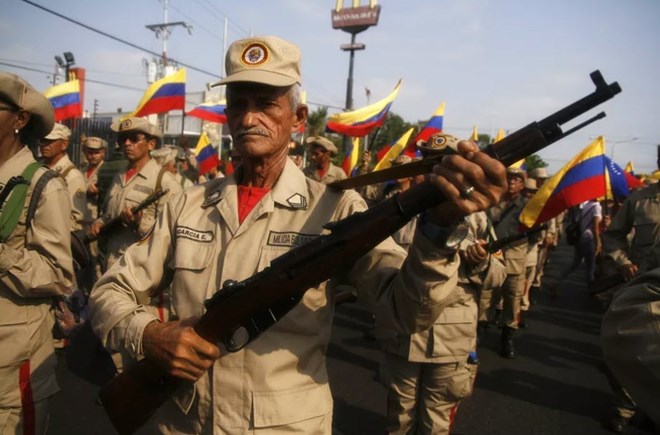
Tuesday February 19, 2019
By Alex Ward

Militiamen, military members, and public employees march in San Francisco, Venezuela, on February 15, 2019, in support of President Nicolás Maduro. Humberto Matheus/NurPhoto via Getty Images
Either Venezuela’s military leaders join Juan Guaidó or risk losing everything.
President Donald Trump just issued an ultimatum to Venezuela’s military: Either join with the US-led effort to depose Venezuelan President Nicolás Maduro, or suffer immense consequences.
Maduro’s troops can defect and support the US-backed challenger — Juan Guaidó — “or you can choose the second path, continuing to support Maduro,” Trump said on Monday at Florida International University. “If you choose this path, you will find no safe harbor, no easy exit, and no way out. You will lose everything.”
Since January, the Trump administration, joined by governments in the Americas and Europe, has called for Venezuela’s socialist president to step down, partly because the country has suffered an immense economic and humanitarian collapse during his rule. The US and others now support Guaidó, the leader of the country’s opposition-controlled legislative body, who claims he is the country’s rightful president.
Guaidó asserts that Maduro rigged the presidential election last May that kept him in power. Citing Venezuela’s constitution, Guaidó and others say the sham vote means that he, as the head of the National Assembly (the country’s legislative body), is now the interim president of the country.
But Guaidó can’t govern the nation until the military supports him, and so far, the leaders of Venezuela’s military stand behind Maduro. Their resolve, however, is facing its biggest test yet.
Three US military planes arrived in neighboring Colombia on Saturday to deliver aid to Venezuelans desperately in need of humanitarian relief due to the country’s high inflation and hunger rates. Maduro has ordered the military to block the aid, saying that the assistance is tantamount to foreign intervention and denying Venezuela faces a crisis.
That may lead lower-level Venezuelan troops — who also suffer from economic hardship — to back Guaidó as he has repeatedly called for Maduro to let the aid into the country. To push those troops over the edge, Trump aimed his Tuesday address directly at them.
“You must not follow Maduro’s orders to block humanitarian aid, and you must not threaten violence” against Venezuelan citizens or Guaidó, he warned the Venezuelan military, while speaking to a Venezuelan expatriate-heavy crowd, part of an effort to garner Hispanic support for his 2020 reelection bid.
The president’s plan, it seems, is to economically squeeze Venezuela’s military leadership until they have no choice but to abandon Maduro, which they could show that is by letting the blocked humanitarian aid into Venezuela and distributing it around the country.
“The strategy is clearly a ‘maximum pressure campaign’-type of strategy geared specifically at the military, which is the only body that matters now in Venezuela,” said Fernando Cutz, formerly the director for South America in Trump’s National Security Council. “What is needed is not for the military to take action, per se, but rather for them to not take action when Maduro orders them to.”
It’s unclear if Trump’s gambit will work, as there are few signs Maduro is losing his grip on power. What is clear is that the US will try everything in its power to see the dictator go.
Maduro is still likely to remain where he is — partly thanks to the military
Despite the pressure, Maduro’s armed forces have stood their ground. In January, for example, the military quickly put down an uprising from 27 anti-Maduro national guard members who seemingly aimed to foment the president’s ouster. Plus, Maduro loyalists control many of the country’s other important institutions, like the country’s Supreme Court.
So Maduro hasn’t stepped down — yet — even though thousands throughout Venezuela have rallied against him for months. He’s already said he won’t leave, and has fought back.
Just hours after Trump’s decision to back Guaidó on January 23, Maduro severed all diplomatic ties with Washington and gave American diplomats 72 hours to leave Venezuela. Secretary of State Mike Pompeo fired back, saying that the US wouldn’t abide by Maduro’s order because the administration doesn’t see him as the country’s president anymore.
The US has turned up the pressure on Maduro, placing sanctions on Venezuela’s oil industry — the main money-maker for the nation. Some US officials, though, tell me all that will really do is “royally piss off” the dictator, even though it may deny his government some money in the short term.
Still, Maduro will likely stay in power. That’s bad news for many people in Venezuela — huge swaths of the population live in poverty because of the socialist dictator’s economic mismanagement.
Inflation in the country now hovers above a million percent, and could reach 10 million percent this year, according to the International Monetary Fund. Food and medicine are too expensive for many to purchase. And since 2015, more than 3 million Venezuelans have left the country in search of better opportunities elsewhere, primarily in Colombia. (It’s expected that another 2 million will become refugees in 2019 alone.)
The political pressure on Maduro has certainly weakened him, and the economic pressure has complicated any attempt to immediately improve the country’s situation. He certainly can’t afford that as his approval rating hovers around 20 percent.
But the reality remains that the most likely result of the current anti-Maduro push is that he remains the country’s leader, albeit a badly bruised one. No Trump speech, as of now, will likely change that.